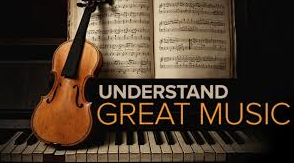🌟 New Year Offer 🌟
Celebrate 2025 with 30% OFF on all products! Use code: NEWYEAR2025. Hurry, offer ends soon!
“Hector Berlioz begins to write the Symphonie fantastique, 1829 and He completes it by 1830, the same year that he graduates the conservatory. File size is 13.76 GB
How to Listen to and Understand Great Music

Learn how to Admire the unmatched beauty and genius and The power of concert music can enrich your life for the rest of your life. Why is this possible? As an award-winning composer and Professor Robert Greenberg explains, “MusicThe most abstract and The most beautiful of all arts, it is capable of transmitting an incredible amount of historical, expressive, and artistic information. and Even philosophical information to We will, provided our antennas remain up and You are pointed in the right direction. A little education can go a long way. to vitalizing and Many people feel it is impossible to make relevant a large body of music.
See the full description
“Why is understanding concert music important?” There are several reasons.
“The skills one brings to listening to music—imagination; abstract, nonconcrete thinking; intuition; and Intutive response and trusting those instincts—have gone uncultivated in our educational system and Culture for too long
“MusicAs a universal, nonverbal language that is universally understood,, allows us to communicate with each other. to Get involved in the social, cultural, and and Different cultures have different aesthetic traditions and Historical eras. We become more aware our shared humanity and The wisdom and Vision of others
“Music We are here to help to Transcend our world and Enjoy completely different realities
“Last, but certainly not least, good music is fun to Listen to, relatively inexpensive—we can do it by ourselves or with others—and There are many options. to Expand our knowledge and The art is worth appreciation.”
The Tools, the Times, and the Composers. and They Music
Grammar: Professor Greenberg will give you a remarkable grasp of musical forms and techniques. and terms—the grammatical elements that make you fluent in the language of music. These are not boring concepts. Professor Greenberg warns us to They are essential:
“Music, like any pseudoscience, requires an adjectival palette by which we can isolate events that without proper terms we might not even be able to notice. It’s an interesting question to what degree language allows us to perceive things that are not language-associated. I’m a strong believer that if you’ve got the right word to identify something, you can perceive it. I think my favorite pseudoscience when it comes to this kind of thing is wine-tasting, where one has to come up with an adjectival palette that is almost a cartoon unto itself. But silly as these phrases may be—’Oh, this has a hint of young tobacco, and old oak fragrant with raspberries’—silly as these terms are, they allow us to draw distinctions without which we may not be able to draw at all. So we will create a useful vocabulary.”
Rich Context: Professor Greenberg discusses the powerful influence of social context upon musical creation. James Collins, best-selling author, explains in Inc. magazine: “The Greenberg series combines a history of Western civilization with a history of great music from ancient Greece to the 20th century. Greenberg’s 48 lectures come alive with passion and knowledge. The course illustrates the interplay between societal change and innovation and offers a unique perspective on the acceleration of change wrought by the 20th century.”
Download immediately How to Listen to and Understand Great Music
Professor Greenberg’s lectures illustrate how musical creativity has been an integral part of the history of civilization. They show how it has provided a vibrant form of expression for grand spiritual and intellectual, political, and social goals. and Economic forces
Whether it’s Bach’s profound influence on Lutheran spirituality or Beethoven’s impact on the French Revolution,to These forces are evident in the lives of music’s creators, just to name two examples and Listeners from different historical epochs. You will also learn how these forces have influenced the creation of musical masterpieces which are both transcendent works and art. and These compositions are deeply rooted within their respective eras and tell us something central to the human condition in each.
The Composers: This course examines the contributions to nearly every major composer. Professor Greenberg’s main goal is to Make their music available andWe must also accept that each one of them was human. and no more. (He mentions that Giuseppe Verdi’s English name would be simply translated as “Giuseppe Verdi”). “Joe Green.”) You will remember their music, and You will never forget the composers who were brought to your attention. to The lectures are an extension of your daily life. Take Professor Greenberg’s introduction into consideration to Berlioz:
“Hector Berlioz begins to write the Symphonie fantastique, 1829 and He completes it in 1830. This is the same year he graduates conservatory. and Still learning his craft.
“The Symphonie fantastique is an experimental artwork if there ever was one. It is an absolutely avant-garde piece of music. It attempts to unite the four great loves of Berlioz’s life, as he felt them then and as they continued to be throughout his life. Those four great loves, in no particular order, are: first, Shakespeare’s plays and Shakespeare’s sense of drama; second: Beethoven’s symphonies, which Berlioz worshipped; third: opera, which Berlioz lived for; and we must not forget the fourth great love of Berlioz’s life: himself. It’s a very autobiographical work. Again, we have to understand that autobiography is very typical of the self-involvement and expressive self-indulgence of the 19th- and indeed, the 20th-century artist.”
The Music: Using digitally-recorded musical passages to Professor Greenberg will guide you through some of the most renowned compositions by Bach and Handel, Haydns, Mozart, Beethoven Chopin, Chopin, Verdi Wagner, Wagner, Brahms Tchaikovsky, Stravinsky to illustrate his points. and more. You have listened. to many of the illustrative pieces all your life—you will never hear them the same way again after Professor Greenberg has opened them up. Take a look at these titles for the lectures in this course to You’ll be amazed at how much you will learn.
Course Features
- Lectures 0
- Quizzes 0
- Duration Lifetime access
- Skill level All levels
- Students 240
- Assessments Yes
